Dental Implants
Implants are an excellent option for replacement of a missing tooth or several teeth. Implants are an alternative to bridges, partials or complete dentures. A titanium screw is inserted into the gums at the site of a single missing tooth, or a series of implants can be placed to form a bridge or support a denture in the case of multiple missing teeth. Over a period of approximately 3- 6 months, the implant is integrated into the bone in your jaw, which provides its strength. A crown, bridge or denture can then be built on top of this implant.
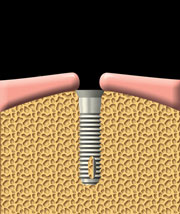
Step 1.
A dental implant is inserted into the jawbone.
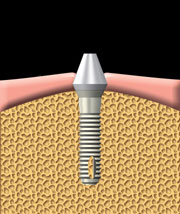
Step 2.
An abutment is attached to the implant. The abutment connects the artificial tooth to the implant.
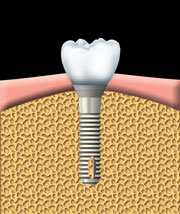
Step 3.
An artificial tooth is attached to the abutment. Properly fitting the artificial tooth may take several appointments.
A fixed bridge is anchored to dental implants to replace one or more teeth.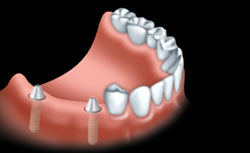
A fixed bridge is anchored to dental implants to replace all teeth.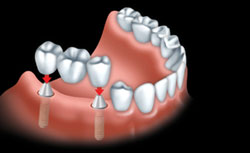
The success rate of implants is one of the highest in dentistry, as is the longevity. Another major benefit to implant treatment is that they are free standing – there is no need to drill and compromise adjacent teeth to replace a missing tooth.
Who does this procedure?
If you are having an implant, your dentist will refer you to a dental specialist who has further training in this area. Specialists who place implants are periodontists or oral and maxillofacial surgeons, also called oral surgeons.
Who can get Dental Implants?
If you are in good general health, have healthy gums and have enough bone in the jaw to hold an implant, dental implants might be right for you. If your jawbone has shrunk or if it has not developed normally, you may be able to have a bone graft to build up the bone. A bone graft is a way of adding new bone to your jawbone. Your dentist or dental specialist will tell you if bone grafting can be done.
Caring for my Dental Implant(s)
Because dental implants are placed in the jawbone, artificial replacement teeth attached to implants look and act much like natural teeth. Like natural teeth, implants need to be kept clean using a toothbrush and floss. Your dentist will show you the proper cleaning procedure for implants. Regular dental checkups are important so your dentist can make sure that your bite is right and that your implants are not loose.
What else should I know?
- Several visits to your dentist or dental specialist may be needed until the process is complete.
- Checkups will be scheduled during the following year so your dentist can be sure your implants are working properly.
- You will need to take very good care of your implants.
- Implants can cost more than other kinds of replacement teeth and might not be covered by your dental plan. But in most cases this is a one-time cost, unlike other kinds of tooth replacement procedures.
- Although rare, possible complications due to dental implants include bleeding, infection, numbness or injury to nearby muscles or the sinus cavity. In some cases, the implant may not be successful because it didn’t bond to the bone.
Contact us to find out if Dental Implants are the solution for you.



